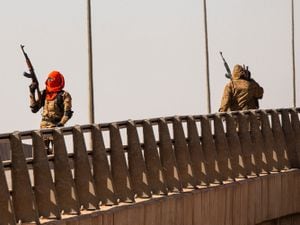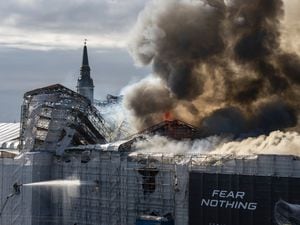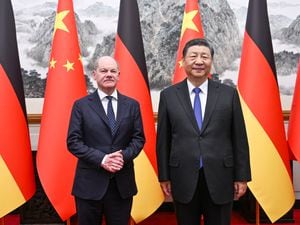President of Burkina Faso ‘held by mutinous soldiers’
Roch Marc Christian Kabore is said to be in a safe place.

Burkina Faso’s President Roch Marc Christian Kabore is being held by mutinous soldiers, according to two of the soldiers.
They did not say where Mr Kabore is being held, but said he is in a safe place.
Gunshots were heard late on Sunday night near the president’s residence and in the early hours of Monday a battle took place at the presidential palace while a helicopter flew overhead.
The roads of the capital were empty on Sunday night except for checkpoints heavily guarded by mutinous soldiers.

State news station RTB was heavily guarded on Monday morning.
Fighting began on Sunday when soldiers took control of the Lamizana Sangoule military barracks in the capital, Ouagadougou.
Civilians drove into town in a show of support for the rebellion but were broken up by security forces firing tear gas.
The mutiny came a day after a public demonstration calling for Mr Kabore’s resignation, the latest in a series of anti-Kabore protests as anger has mounted over his government’s handling of the Islamic insurgency.
The government has not made any statements since Sunday when minister of defence Aime Barthelemy Simpore told state broadcaster RTB that a few barracks had been affected by unrest not only in Ouagadougou but in other cities, too.
He denied, however, that the president had been detained by the mutineers, even though Mr Kabore’s whereabouts was unknown.
“Well, it’s a few barracks. There are not too many,” Mr Simpore said.
Mr Kabore had been leading Burkina Faso since being elected in 2015 after a popular uprising ousted longtime strongman president Blaise Compaore, who was in power for nearly three decades.

Mr Kabore was re-elected in November 2020 for another five-year term, however, frustration has been growing at his inability to stem the spread of jihadist violence across the country.
Attacks linked to al Qaida and the so-called Islamic State group are escalating, killing thousands and displacing more than an estimated 1.5 million people.
The military has suffered losses since the extremist violence began in 2016.
In December more than 50 security forces were killed in the Sahel region and nine security forces were killed in the Centre North region in November.
Angry mutinous soldiers told the Associated Press that the government was disconnected from its forces in the field and that their colleagues were dying and they wanted military rule.
The soldiers put a man on the phone who said that they were seeking better working conditions for Burkina Faso’s military amid the escalating fight against Islamic militants.
Among their demands are increased manpower in the battle against extremists and better care for those wounded and the families of the dead.
About 100 military members have planned the takeover since August, according to one of the mutinous soldiers.

The organisers never met in the same location more than twice and always outside the capital, he said.
They used messaging apps such as Signal, WhatsApp and Telegraph to plan, he said.
Regional experts say the Kabore government was overstretched but it is unlikely the mutiny will change anything.
“Burkina Faso’s army is profoundly ill-equipped and unprepared for the war it’s asked to fight. It’s out of its depth. Its frustration with an equally out of its depth government is understandable. Regrettably, this (rebellion) is unlikely to improve anything,” said Michael Shurkin.
He is a former political analyst at the CIA and director of global programmes at 14 North Strategies, a business intelligence consultancy based in Dakar, Senegal, who has concentrated on analysing West Africa’s Sahel region for 15 years.





